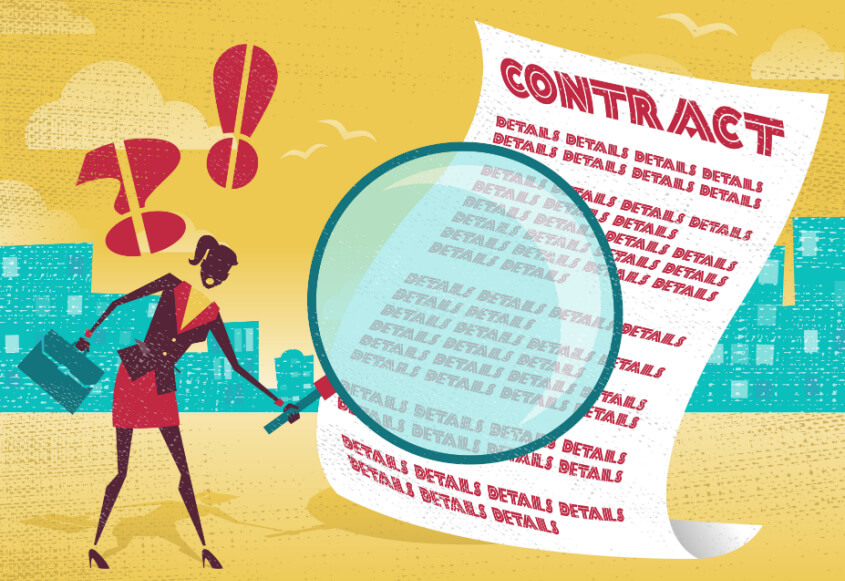Content
Recent Posts
The Top Auto Warranty Scams & How to Spot Them

Auto warranty scams are a growing concern among car owners. According to the Federal Trade Commission (FTC), consumers lost over $30 billion to auto warranty scams in 2021. These scams can trick you into buying fake warranties or paying for coverage that doesn't exist. The good news is that they can be easy to spot if you know where to look, and we want to help you do just that.
Content
This blog post will explore the top auto warranty scams or strategies and how to recognize them and protect yourself. We will tell you about fake warranty companies, scammers' tactics, high-pressure sales tactics, and phishing scams. We'll also provide you with some tips on how to spot these scams before it's too late.
We'll also offer you some best practices for approaching auto warranty purchases, such as researching and comparing, reading the fine print, contacting multiple lenders, and asking questions. Don't let these scammers take advantage of you - arm yourself with knowledge and protect your investment!
What Are Auto Warranty Scams?
Auto warranty scams are a common danger that you must watch out for as a vehicle buyer or owner. Scammers use different tactics to lure their victims into purchasing extended warranties immediately, like high-pressure sales tactics or robocalls offering lifetime warranties with no restrictions.
Scammers can present themselves as being from a legitimate source, such as your car’s manufacturer or a third-party provider you may have dealt with. Such scams will still technically cover your car, but they will have you sign a contract with many hidden limitations and exclusions. Alternatively, scammers might come from totally fake companies, which give you no coverage. Such fake warranty companies may ask you for personal information or an upfront payment. This puts your sensitive information in malicious hands, increasing your risk for identity theft.
To avoid falling victim to these scams, always research the company and read reviews before purchasing an auto warranty. And watch out for certain red-flag behaviors when you’re contacted about auto warranties.
Typical Scammer Tricks
It's crucial to be cautious when dealing with auto warranty offers online or over the phone. Scammers may use high-pressure tactics to pressure potential buyers into purchasing a warranty immediately. They may even falsely claim that your current warranty is about to expire or that your car is at risk of breaking down without the extended coverage.
Unsolicited calls or emails offering warranties are common scams. We will help you spot those scams by identifying scammers' tactics and how they try to get to you. You will be empowered to protect yourself from being taken advantage of once you can identify a scam.
Fake warranty companies
When considering purchasing an auto warranty, it is important to be cautious of fake warranty companies. Some might use your manufacturer’s or a legitimate warranty provider’s name to get you to trust them, while others use high-pressure tactics to build up their fake companies. If you get a call or email claiming to be from your dealership or a company you’ve dealt with, we recommend contacting that company to check if it actually came from them.
In general, unsolicited phone calls or mailings offering extended warranties should raise red flags with you. Scammers from fake companies want you to be impulsive, and they prey on your ignorance. So always research the company online and read customer reviews for legitimacy.
At Several.com, we have information on legitimate companies that you can access in several ways, including our comparison tool or blog, with up-to-date facts. It's also good to check a company's government registration, such as with the Better Business Bureau, to ensure it is real.
High-pressure sales tactics
Scammers use high-pressure sales tactics to force buyers to purchase needless or deceitful warranties. They may use scare tactics, such as creating a false sense of urgency by declaring that your car is about to break down or that your warranty is about to expire. If you feel pressured to sign right away or are scared into it, it’s likely an outright lie designed to make you give them your money and personal information without thinking. Don't fall for it.
It's critical to conduct thorough research on the organization and read reviews from other customers before committing to any purchase. Genuine businesses do not coerce customers into making purchases and provide comprehensive information regarding their products in a transparent manner.
Fine print
Scammers who claim to sell auto warranties could sometimes sell you actual coverage, but in the form of a vehicle service contract (VSC). They might claim to be from your dealership, manufacturer, or warranty provider while hiding their true identity and details in the contract text you won’t read.
A VSC is usually bought from a dealership and offers much more limited coverage for a lower cost. You will have higher deductibles and pay more out of pocket with a VSC, and it might not be transferable to a new owner if you sell your vehicle. A scammer will falsely pass it off as an extended warranty, claiming it gives you wider coverage than it actually does, and they may price it higher as a result.

As a savvy consumer, the fine print is where you can catch overpriced or unnecessary policies for what they are, and find out whether a policy is actually a “warranty”. The fine print is not always small, per se, but it is often difficult to read and understand, and you might feel discouraged to read it. It makes it difficult to know what you are buying, and you might feel scammed out of your money. Do yourself a favor and read through it all before signing anything.
The fine print comes in the form of hidden fees, exclusions, and limitations, and it can affect you in these ways:
- Hidden fees: These present as monthly or annual premiums, deductibles, or service fees. These fees can add up, and they may not be disclosed to you upfront
- Exclusions: The fine print may contain exclusions for certain types of repairs, such as wear and tear, maintenance, or damage caused by accidents. This means that the warranty may not cover the repairs that you need, and you may be responsible for the total cost of the repair
- Limitations: There could be limitations on the amount of coverage that is provided. For example, the warranty may only cover repairs for a certain period of time, or only cover repairs up to a certain dollar amount. You may be responsible for paying repairs that are not covered by the warranty
Top Strategies Used by Auto Warranty Scammers
Scams involving extended automotive warranty sales will take on many shapes and presentations. You might find it tough to spot fraudulent behavior because of the language and technologies used to push these scams. If you are tricked by such fraudulent behavior, your personal information could then be used to open accounts, get loans in your name, or steal your identity.
The good news is that you can always protect yourself by being aware of and educated about the tactics scammers use. Get to know their tricks so that they have no power over you.
Robocalls & unsolicited mail
One of the most common auto warranty scams is receiving robocalls or unsolicited mail claiming that your car warranty is about to expire. These scammers will often try to catch you unprepared, then pressure you into purchasing an extended warranty. They could even claim that you need immediate repairs.
To avoid this scam, never give out personal information over the phone or through email, and always research the company before making any purchases.
Phishing scams
A phishing scam is a type of online scam where the attacker sends you an email or text message that appears to be from a legitimate company, such as a bank, credit card company, or your car manufacturer. This message will often contain a link that, when clicked, will take the victim to a fake website that looks genuine or like the website of the real company. Once you enter your personal information on the fake website, the attacker can use it to steal your identity.

To protect yourself from phishing scams, it's essential to verify the identity of the company before providing any sensitive information or payment. Unsolicited emails that offer too-good-to-be-true deals on auto warranties should be approached with caution. Legitimate companies will never ask you for passwords or credit card numbers via email or phone. Protect your personal and financial information by being wary of these fraudulent messages.
Door-to-door sales
Some auto warranty scammers may go door-to-door, claiming to offer extended warranties or repairs. This low-tech strategy might not be as common as before, but it could be effective because it's harder to refuse a person physically in your living room than a call or email.
To avoid this scam, never let anyone into your home without verifying their identity and the legitimacy of the company.
How to Spot Auto Warranty Scams
Whether you are receiving communication (calls, emails, etc.) about an extended warranty from potential scammers or doing your own research for a purchase, we have some advice to protect you from being tricked. Remember to always take your time verifying all aspects of a policy or message, especially if something seems too good to be true. The following methods should help you avoid these scams:
- Be cautious or avoid unsolicited communication: Any cold calls, mailings, or online messages offering warranties can be scams, especially if they come from sources you don't know. Always be cautious and conduct your due diligence before moving forward
- Check your VIN Number: You want to check the compatibility of the offered warranty with your vehicle's make, model and year via the Vehicle Identification Number (VIN). You can do so by contacting your dealer or by using online tools like a VIN decoder. Make sure that coverage is provided for repairs that align with your driving habits and the age/condition of your car
- Verify the warranty company: To avoid being scammed when buying an extended auto warranty, it's essential to verify the authenticity of the provider. Check reviews and ratings online, and ensure that they offer clear terms and conditions. You can use our comparison tool to pit the company against others and ensure it's right for you
- Verify registration with governing bodies: Checking a company’s registration with the Better Business Bureau, for example, is a good way to make sure the company is legitimate, not fake
- Look for HTTPS: When you ensure that the website's URL starts with HTTPS, you can be sure that your personal and financial information is secure. Scam artists often use unsecured sites to steal sensitive data such as social security numbers, credit card details, or bank account information

Best Practices for Approaching Auto Warranty Purchases
When thinking of buying an auto warranty, you need to be careful and consider all aspects to avoid falling victim to common scams. Doing your due diligence could be a lengthy task, and we want to simplify it for you with the following four-part approach:
1. Research & compare
You, as a consumer, should always know your options. And when shopping around for auto warranties, it’s important to exercise caution but also cast a wide net. Comparing multiple providers helps you avoid falling victim to scams because it will help you see normal trends in coverage and how policies are usually presented.
A good place to compare pricing and coverage options from various companies is on Several.com. You can also check for reviews online, looking carefully for firms with trustworthy reputations, positive customer feedback, and transparency in their terms and conditions.
Before selecting an auto warranty provider, verify whether the warranty supplies the exact repairs or components you require for your car, and provides you with perks you can use.
2. Read the fine print
Before you commit to an auto warranty purchase, thoroughly review the fine print. Understand all the terms and conditions of the contract while making sure that there are no hidden fees or restrictions that might leave you with unexpected costs.
Aside from taking note of all fees mentioned in the contract, watch out for and understand any coverage limitations, like only covering repairs for a certain period of time, or up to a certain dollar amount. Also look at whether there are exclusions for wear and tear or maintenance, and whether the policy would transfer should you sell your car.
Look out for half-truths disguised in confusing legal jargon that may indicate a scammer is at work. If you come across really complicated language, consult a trustworthy source for clarity. This will help you avoid becoming a victim of one of the many common scams targeting warranty buyers.

3. Ask questions
We think that being cautious when making a purchase decision means asking a lot of questions. You will find that inquiring about all the coverage options and exclusions of the policy will put you at ease.
You should ask questions about the company's track record and reputation in the industry, while also clarifying confusing or unclear terms or conditions. If you don’t receive answers that satisfy you, ask to review a sample contract and take your time reading it. Of course, if they struggle to answer your questions satisfactorily, that might be a sign you have to move on from that company.
4. Don't make hasty judgments
Auto warranty purchases can be a significant cost as well as a comfort, so you should consider them well before acting. Take your time! Don't let a supposed salesperson pressure you to act immediately, and certainly don't share sensitive information like social security numbers or bank account details when purchasing warranties online.
Conclusion
Auto warranty scams are a menace that can cause havoc in your life. They could leave you in a financial bind with an untrustworthy policy or with no coverage at all. Scammers have gotten very savvy and now use many strategies to try to trick you into overpaying, paying for non-existent services, or giving them the information they need to steal your personal data and identity. It’s important to be aware of the different types of scams and tactics used to dupe you into buying fraudulent warranties.
We generally find the best strategy to ensure you don't get scammed is to do your own research— often and thoroughly! By doing things like checking the VIN number, verifying the warranty company, and looking for HTTPS, you can protect yourself from these scams.
It’s also useful to do comparison research, read the fine print, contact multiple providers, and ask questions before making any purchase. Don't fall prey to these scams; follow the best practices we outlined so you can approach auto warranty purchases feeling secure and satisfied. Caution is always better than being scammed.